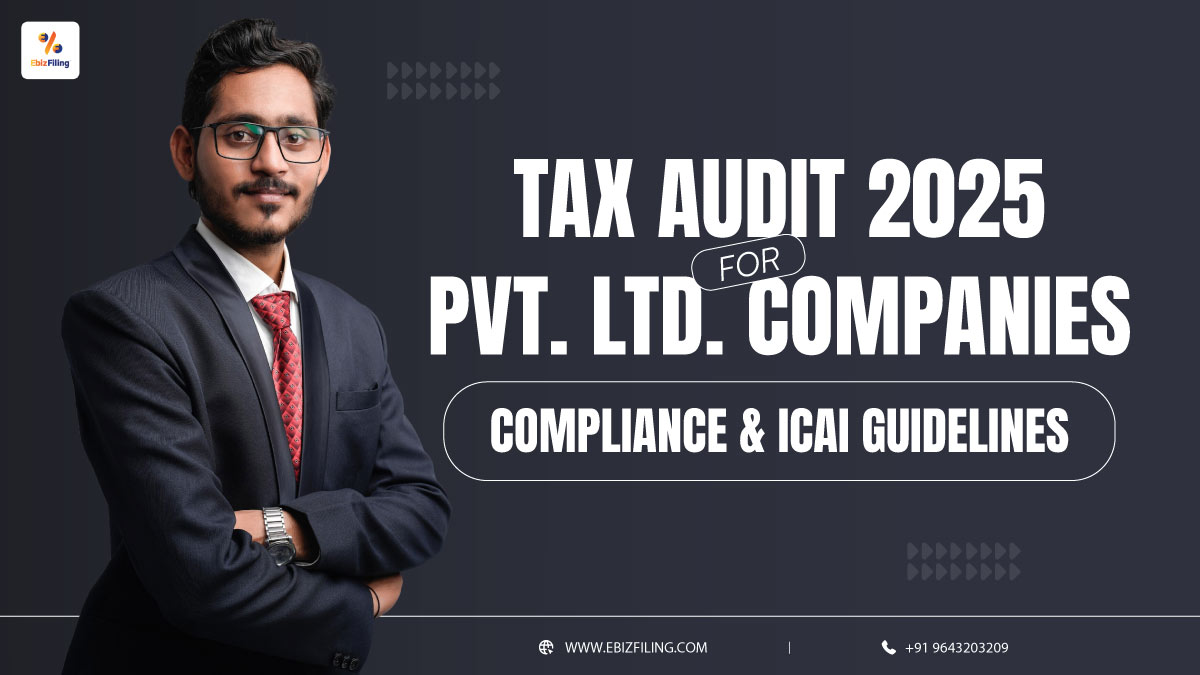
-
November 4, 2025
-
ByDhruvi D
Tax Audit for Private Limited Companies : Rules, ICAI Guidelines, and Extended Due Date
Introduction
A Tax Audit ensures that the financial statements of a Private Limited Company meet the requirements of the Income Tax Act. It becomes mandatory under Section 44AB once turnover or receipts exceed specified limits. With ICAI’s restrictions on the number of audits per Chartered Accountant and CBDT’s extension of the deadline for AY 2025-26, it is important for companies to stay updated.
Tax Audit Process for Private Limited Companies
-
Appoint a Chartered Accountant with available capacity under ICAI limits.
-
The CA prepares Form 3CA/3CB and Form 3CD based on company records.
-
The report is uploaded on the Income Tax Portal using DSC.
-
The company’s authorized signatory accepts the report.
-
The audit report is linked to the company’s Income Tax Return (ITR).
Applicability of Tax Audit
|
Category |
Applicability |
|
Business (General) |
Turnover above ₹1 crore |
|
Business (95%+ digital transactions) |
Turnover up to ₹10 crores, cash ≤ 5% |
|
Professional services |
Receipts above ₹50 lakhs |
|
Presumptive scheme opt-out |
Declaring profits below prescribed rate under 44AD/44ADA |
For statutory audit deadlines under the Companies Act, you can also check our detailed guide on Private Limited Company Audit Due Date FY 2024-25.
Extended Due Date for AY 2025-26
The CBDT has extended the due date for filing Tax Audit Reports for AY 2025-26 from 30th September 2025 to 31st October 2025.
This extra month gives companies more time, but it is still advisable to complete the audit early to avoid technical glitches or last-minute errors.
ICAI Limit on Tax Audits
The Institute of Chartered Accountants of India (ICAI) has capped the number of tax audits a Chartered Accountant can undertake at 60 per year, effective from 1st April 2026.
-
This applies to both individual CAs and partners in firms.
-
Audits conducted under presumptive taxation schemes are not counted in the limit.
-
Revised reports do not reduce the audit count.
You can review the official notification here: ICAI Announcement – July 2025.
Penalty for Non-Compliance
If a company fails to file the Tax Audit Report on time:
-
A penalty of 0.5% of turnover or ₹1,50,000 (whichever is lower) may be levied under Section 271B.
-
Relief is possible under Section 273B for genuine reasons such as natural disasters, illness, or technical issues.
Statutory Audit vs Tax Audit
|
Statutory Audit |
Tax Audit |
|
Mandatory under Companies Act, 2013 |
Mandatory under Income Tax Act, Section 44AB |
|
Applies to all Private Limited Companies |
Applies only when turnover crosses limits |
|
Focuses on the fairness of financial statements |
Focuses on tax compliance and disclosures |
Conclusion
For a Private Limited Company, a Tax Audit is as important as a statutory audit but serves a different purpose. With ICAI audit limits and the CBDT extending the filing deadline to 31st October 2025, companies should prepare early to ensure timely compliance.
Suggested Read :
Understanding Presumptive Taxation under Section 44AD, 44ADA & 44AE
Income Tax Return(ITR) Compliance Calendar With Due dates for FY 2025-26
What is Form 3CD?”, “What is Form 3CB?
ROC Annual Compliance Calendar for Pvt Ltd Company FY 2024-25
FAQs on Tax Audit and Tax Audit Return
1. Is a Tax Audit mandatory for every Private Limited Company?
No. Every Private Limited Company must undergo statutory audit, but tax audit under Section 44AB is required only when turnover crosses the specified limits.
2. What is the extended due date for Tax Audit in AY 2025-26?
The CBDT has extended the due date to 31st October 2025.
3. How many audits can a Chartered Accountant perform?
ICAI allows a maximum of 60 tax audits per year from April 2026.
4. Can the same Chartered Accountant conduct both statutory and tax audits?
Yes, provided they have capacity under ICAI’s audit limits.
5. What is the penalty for missing the Tax Audit deadline?
The penalty is 0.5% of turnover, up to ₹1,50,000 under Section 271B.
6. Where can I check statutory audit deadlines for companies?
You can read our guide on Private Limited Company Audit Due Date FY 2024-25.
7. Where can I read ICAI’s official announcement on audit limits?
You can check it here: ICAI Announcement – July 2025.
8. Is presumptive taxation available to Private Limited Companies?
No, presumptive schemes under 44AD and 44ADA apply only to individuals, HUFs, and partnerships, not companies.
9. What forms are used for filing Tax Audit Reports?
Forms 3CA/3CB along with Form 3CD are filed on the Income Tax Portal.
10. What is the key difference between statutory and tax audit?
A statutory audit ensures compliance with the Companies Act, while a tax audit ensures compliance with the Income Tax Act.
Pvt Ltd Annual Filing
EbizFiling – Your Pvt Ltd Annual Compliance Partner!
About Ebizfiling -










February 18, 2026 By Steffy A
Consulting Firms vs Compliance Platforms: Which to Choose in 2026? Introduction At Ebizfiling, we often hear this question from clients: “Why hire a consulting firm when compliance platforms are cheaper?” While compliance platforms are more affordable, they often […]
February 18, 2026 By Steffy A
Top ROC Filing Tools Every Business Should Know Introduction ROC filing is an important responsibility that businesses cannot ignore. Under the Companies Act, 2013, every registered company must submit annual returns and financial statements to the Registrar of Companies […]
February 18, 2026 By Steffy A
How XBRL Tools Simplify Financial Reporting Introduction With new regulations, manual financial reporting has become impractical. Many companies now use XBRL tools to simplify the process. These tools convert financial data into the digital format required by regulators, reducing […]